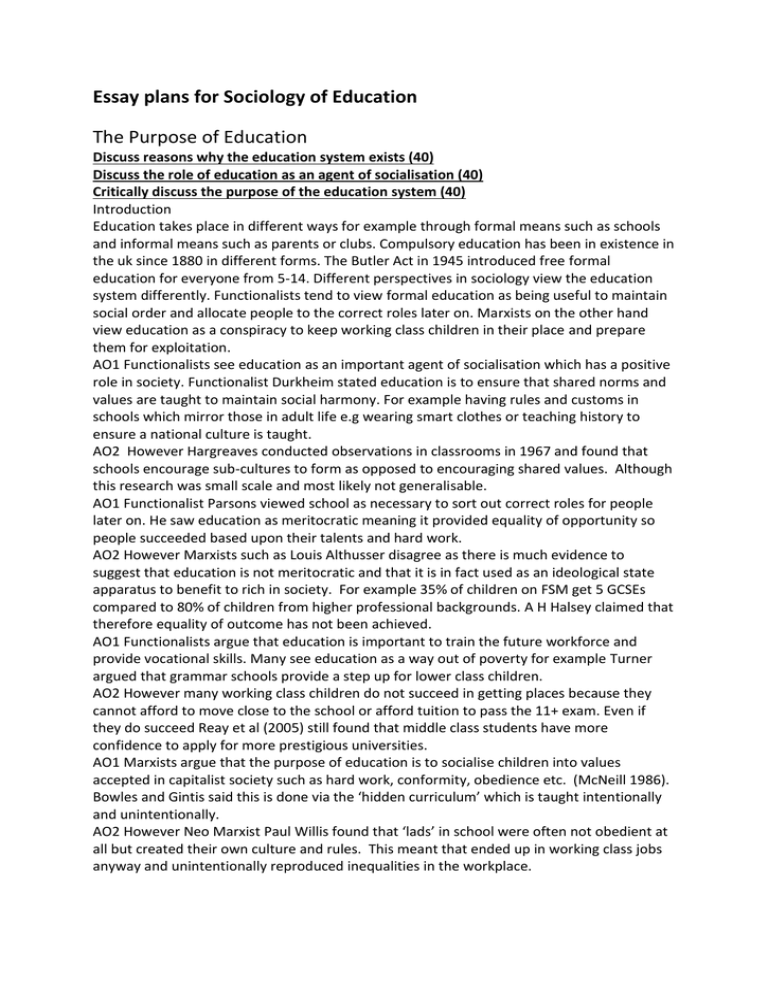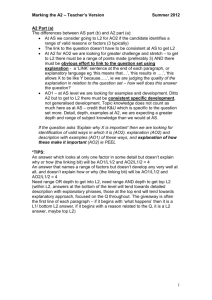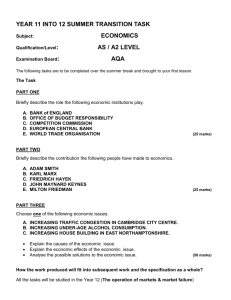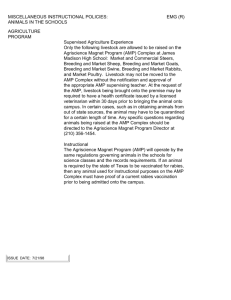Essay plans for Sociology of Education
advertisement

Essay plans for Sociology of Education The Purpose of Education Discuss reasons why the education system exists (40) Discuss the role of education as an agent of socialisation (40) Critically discuss the purpose of the education system (40) Introduction Education takes place in different ways for example through formal means such as schools and informal means such as parents or clubs. Compulsory education has been in existence in the uk since 1880 in different forms. The Butler Act in 1945 introduced free formal education for everyone from 5-14. Different perspectives in sociology view the education system differently. Functionalists tend to view formal education as being useful to maintain social order and allocate people to the correct roles later on. Marxists on the other hand view education as a conspiracy to keep working class children in their place and prepare them for exploitation. AO1 Functionalists see education as an important agent of socialisation which has a positive role in society. Functionalist Durkheim stated education is to ensure that shared norms and values are taught to maintain social harmony. For example having rules and customs in schools which mirror those in adult life e.g wearing smart clothes or teaching history to ensure a national culture is taught. AO2 However Hargreaves conducted observations in classrooms in 1967 and found that schools encourage sub-cultures to form as opposed to encouraging shared values. Although this research was small scale and most likely not generalisable. AO1 Functionalist Parsons viewed school as necessary to sort out correct roles for people later on. He saw education as meritocratic meaning it provided equality of opportunity so people succeeded based upon their talents and hard work. AO2 However Marxists such as Louis Althusser disagree as there is much evidence to suggest that education is not meritocratic and that it is in fact used as an ideological state apparatus to benefit to rich in society. For example 35% of children on FSM get 5 GCSEs compared to 80% of children from higher professional backgrounds. A H Halsey claimed that therefore equality of outcome has not been achieved. AO1 Functionalists argue that education is important to train the future workforce and provide vocational skills. Many see education as a way out of poverty for example Turner argued that grammar schools provide a step up for lower class children. AO2 However many working class children do not succeed in getting places because they cannot afford to move close to the school or afford tuition to pass the 11+ exam. Even if they do succeed Reay et al (2005) still found that middle class students have more confidence to apply for more prestigious universities. AO1 Marxists argue that the purpose of education is to socialise children into values accepted in capitalist society such as hard work, conformity, obedience etc. (McNeill 1986). Bowles and Gintis said this is done via the ‘hidden curriculum’ which is taught intentionally and unintentionally. AO2 However Neo Marxist Paul Willis found that ‘lads’ in school were often not obedient at all but created their own culture and rules. This meant that ended up in working class jobs anyway and unintentionally reproduced inequalities in the workplace. AO1 Pierre Bourdieu claimed that inequalities in society are perpetuated in education because schools are middle class environments with middle class teachers. Children with working class culture lack ‘cultural capital’ and are seen as less desirable by teachers and treated differently. He called this ‘symbolic violence’ against the culture of working class children. AO2 However this argument makes the assumption that teachers are unaware of class issues and are agents of the bourgeoisie which may not be true. Conclusion From a Functionalist perspective the purpose of education is a positive one as it ensure shared culture is passed on and social order is maintained. On the other hand Marxists argue that education exists to benefit the rich and ensure that they maintain their dominance over the working classes. Meritocracy The education system is not equal for all children – discuss (40) Meritocracy is a myth – discuss (40) Introduction Outline and define what education is and what meritocracy is (Functionalist idea) AO1 system has aimed for equality of opportuntiy since WW2 with range of policies – give examples - EMA AO2 A H Halsey states equality of opportunity may exist but equality of outcome does not – give example AO1 Schools themselves are not equal – refer to New Right Marketisation and private schools. AO2 Karl Turner – schools with high % on FSM will not get good Ofstead. AO1 There are still inequalities in gender, ethnicity and social class in schools – Lucey states working class children do not live near good schools, Mac n ghaill working class boys fail, Black children perform worse than chinese and indian. AO2 McKnight researched statistics and found New Labour policies have improved education Ao2 However used secondary sources provided by government ?? AO1 Children only spend 14% of their time at school so failure may be due to other factors outside of school not the schools themselves. Marxists would argue that material deprivation contributes to failure at school and that capitalist society is to blame. AO2 However Rosethal and Jacobson conducted en experiment to find out how labelling can affect achievement in school and found children randomly labelled as ‘spurters’ with high IQ did better. AO2 Although this experiement was unethical and teacher did not remember who the spurters were which suggests they had not labelled them differently. AO1 Marxists would argue that schools are not equal for all children as much evidence suggests – give examples. Bowles and Gintis argue that the hidden curriculum favours middle class children and teaches working class children to be subordinate. AO2 However another argument is that it is the culture of the home that is at fault. Charles Murray viewed working class culture as deviant and blamed single parents for incorrect socialisation of children leading to failure at school. Cultural deprivation E.g Douglas found a correlation between interest of parents and success at school. Also Bernestein found use of elaborate code of middles class teachers disadvantages working class children. Conclusion On the one hand schools can be seen as meritocratic because a range of equality policies have been introduced and also a range of measures like free school meals and EMA to ensure working class children are not disadvantaged. However on the other hand these policies have not been entirely successful and equality of outcome has not been achieved. The system is not entirely meritocratic as wealthier children are able to pay for or get into better schools. Social Class and Location Outline and assess the view that a child’s location has an impact on their success in education (40) Outline and assess the impact of social class on educational attainment (40) Introduction Social class refers to economic status of individuals as well as attitudes and lifestyles. Location is linked to social class because post codes in Britain reflect the wealth of the people who live there. Inner city areas tend to be poorer containing a concentration of working class and ethnic minority families. There is evidence to suggest that working class children do not do as well in education and that schools in poor locations also do not perform as well. AO1 Bynner and Joshi found that social class differences in education have persisted for over 50 years. For example only 35% of children on FSM get 5 GCSE’s A*-C compared to 80% of children from higher professional background. AO2 In recent years there has been massive abour funding in education particularly aimed at addressing inner city failing schools with the academy programme and the Excellence in Cities programme but this appears to have had little success in improving the gap. AO1 In 1979 Margaret Thatcher cam to power and introduced new right policies in education turning the system into a market place where schools competed for funding. Explain in more depth some of the policies AO2 The labour governmetn continued these policies and McKnight conducted research using official statistics and found that education had improved overall AO2 However used secondary sources provided by the government which may not be valid. AO1 Lucey argued that schools in poor areas have been demonised by middle class parents who can afford to move or pay for bus fares flock to better schools leaving schools in working class areas underfunded. AO2 In support of this view Turner found schools with high % on FSM were unlikely to get good ofsted. This means that working class children who can only afford to go to local schools are left in poor performing school with higher teacher turnover and lack of resources. AO1 Pierre Bourdieu coined the term ‘Habitus’ to reflect the way that geographical location has a bearing on culture and attitudes which may include attitude to education. For example in some middle class areas of Scotland 83% of students expect to go to university. AO2 However Harrison research schools in Hackney and found that poverty also has a significant impact on education attainment AO1 Turner also suggested that some systems e.g grammar schools allowed people at the bottom to get good education. AO2 However only certain areas still have grammar schools and middle class parents can afford tuition to pass 11+ exam and to move closer to the schools. AO1 The failure of working class children may not only be due to living close to failing schools or to poverty at home. New Right theorists suggest it may be related to the culture in the home.Douglas (1964,1970) Studied home influence on education attainment. Longitudinal study found correlation between parental interest and achievement in education. AO2 However many working class parents have high aspirations for their children but are unable to negotiate the system due to a clash of working class culture and the very middle class culture of the school.e.g Bernstein studied influence of speech patterns on education. Found middle-class students use elaborate code similar to teachers whereas working-class use limited code. Conclusion There is evidence to suggest that location and social class have a signficant bearing on educational success however social class is not the only way in which attainment differs, there are differences in gender and in ethnicity – but social class is by far the most significant. If you are middle class living in a middle class area you will more likely to have access to a better performing school. Marxism Outline and assess Marxist views of education (40) To what extent is the education system of the UK for the benefit of the wealthy? (40) Education exists to prepare the masses for exploitation – Discuss (40) AO1Introduction - Outline what Marxism is in general Briefly explain Marxist views on education AO2 Contrast this to Functionalism AO1 One Marxist view is that education is an important agent of socialisation which prepares children for subordinate positions and exploitation within capitalist system. Louis Althusser called this Ideological State Apparatus. AO2 However not all working class children fail in school and end up in low-paid jobs. AO1 Another Marxist view is that Ed is to reproduce an obedient workforce to meet the needs of capitalism. Evidence is from Bowles and Gintis, correspondence theory and hidden curriculum. AO2 Are children in school really that obedient and unquestioning? Are all teachers in favour of ruling-class ideology? AO1 Marxists also believe that material deprivation caused by capitalism disadvs W/C children, recent govt turnaround on EMA supports this argument. AO2 Although Pierre Bourdieu argues that it is cultural capital (middle-class ways of behaving and speaking in school that advs M/C children. AO1 A Neo-Marxist view is that young people resist capitalism by rejecting the school system. (Henry Giroux) Evidence is ethnographic study by Paul Willis – 12 ‘lads’ . Resistance only lead them to lowpaid insecure jobs. AO2 This shows that the ed system reproduces class inequality. However Willis’’ study used participant observation of only 12 pps and is therefore not very reliable or generalisable AO1 One strength of the Marxist view. It points out the existence of the hidden curriculum (Bowles and Gintis) However Reynolds notes that it would be impossible for schools to be completely controlled by the ruling class and that teachers are not unaware of class issues in school, AO2 The Marxist view also recognises class inequalities and how there is conflict s of interests(in contrast to the Functionalist consensus view that school teaches shared norms and values. AO1One weakness is that Feminists might argue that it focuses too heavily on class inequalities and so is race and gender blind. AO2 However traditional marxism did state that women and ethnic minorities are more disadvantaged by capitalism. Another weakness is that the labour govt have put in place many policies to ensure education is meritocratic such as encouraging uni’s to accept more W/C students. AO2 Although only 1 in 5 HE students are W/C and Reay et al (2005) found M/C students more confident to apply for prestigious uni’s To conclude – Sum up, weigh up and contrast to Functionalism and meritocracy Ethnicity Schools are institutionally racist – discuss (40) Discuss the view that the failure of some ethnic minorities in schools can be blamed on teachers (40 Introduction - It has been known for a long time that different ethnic groups appear to have differing rates of attainment in the education system. Although some writers such as H J Eysenck and the geneticist, James Watson have claimed that there are differences in ability between various ethnic groups and 'races', AO2 the evidence for this view is very poor indeed. Other explanations are that schools are instutionally racist against some groups or that ethnic minorities suffer from cultural deprivation. AO1 It was not until 2003 that the government first published statistics showing GCSE pass-rates across different ethnic groups. Statistics show that Indian, Chinese, and African-Asian pupils consistently have higher levels of achievement than other ethnic groups across all the Key Stages. In contrast, Black, Pakistani, Bangladeshi and Gypsy/traveller pupils consistently have lower levels of attainment than other ethnic groups across all the Key Stages. AO2 However an interesting fact about the current education system is that the worst performing group (in terms of achieving five A*-C grades at GCSE) is white working-class boys. AO1 African-Caribbeans have the highest exclusion rate, three times the rate of white pupils. Bourne et al (1994) explain this as White teachers feeling threatened. Others suggest it results from behaviour that stems from frustrations of racism. AO2 However there has been an increase in numbers of black teachers for example in Hackney AO1 Tony Sewell (1997) identified peer pressure and street culture as a key factor to explain why many Black-Caribbean pupils' achievement declines through secondary school. He sees the high number of boys who grow up in female single-parent families as a factor, and points out that this makes boys vulnerable to negative influences of peer pressure and street culture. Boys are attracted to a culture of masculinity which undermines the value of schooling and education qualifications. AO2 Critics of Sewell argue that he ignore a racist ethnocentric hidden curriculum, prejudiced teacher attitudes and racist policies of the educational system. AO1 Cecile Wright (1992) researched four inner-city primary schools and found evidence that teachers treated ethnic minority children differently from White children. AO2 In support of this claim Gillborn and Youdell (2001) found evidence that racism is still a key factor in educational underachievement. In a study of two London schools they found black children were the lowest achieving group. AO1 Working-class and black pupils were more likely to be allocated to lower sets than middle class children doing work of the same standard. They were also less likely to be entered for higher tiers of GCSE. AO2 However this suggests that class may be as equally important as ethnicity. AO1 Government statistics show that 70% of Bangladeshi pupils and almost 60% of Pakistani and Black African pupils live in the 20% most deprived postcode areas compared to less than 20% of White British pupils. AO2 This suggests that poverty affect attainment and this is something that teachers can do little about. AO1 The culture of ethnic minorities may also be an issue as Pierre Bourdieu found that students with cultures that differ from teachers do not do as well. Mac an Ghaill (1988) found that the 'Creole' or 'patois' spoken by African-Caribbeans could cause problems; either through causing misunderstandings for them or not being understood by teachers. AO2 However this is also an issue for white working class students who may use a limited language code compared to teachers’ elaborate code (Bernstein). Conclusion – summarise points and weigh up evidence of racism in schools. Interactionsim Outline and assess the view that teachers affect the educational attainment of pupils (40) Outline and evaluate interactionist view of the education system (40) Intro – Sociologists are interested in how education affects the attainment of some students e.g working class, genders, ethnic groups. Factors identified are ….Labelling, setting, Hidden curriculum, institutional racism and competition between schools. AO2 However these factors ignore the influence of cultural and material deprivation which stems from home. Outline interactionism - we gain sense of self from interactions with others/ and labelling theory Becker - master status and self fulfilling prophecy.(11+ failure is a big issue here) AO2 Give criticisms including comparison other factors outside of school e.g material and cultural deprivation and marxism. Outline evidence which supports labelling theory – Rosenthal and Jacobson Pygmalion experiment AO2 Evaluate the study using criticisms – teachers did not remember ‘spurters’ the study may have used invalid IQ tests and other evidence e.g Mirza says black and asian girls succeed to spite teachers so reject labels given to them. Hargreaves states labelling leads to development of sub-cultures which can be seen as resistance to labelling also. AO2 How do we know that teachers’ labels are not correct in the first place i.e that some pupils are just not as able and teachers can recognise this. Outline Hidden curriculum Marxist view – Bowles and Gintis Marxists claim that we should consider who creates labels i.e bourgeoisie have the power to do this. AO2 In support Cicourel and Kitsuse argue labels are based on social class. Also give some criticisms e.g are teachers all bourgeiosie? Compare to Functionalist view of Meritocracy Outline New Right policies which may affect e.g A-C economy setting and league table. Or use institutional racism in schools affecting ethnicity and achievement. AO2 Criticise using marxist view of working class children in lower sets – correspondence theory, cultural capital or cultural deprivation e.g Bernsteins elaborate speech code. FSM meals are indicator of poor ofstead Overall interactionist theories are useful from a point of view of seeing how individuals react to the social world. However there are some criticisms, it uses qualitative methods which are not scientific, labelling theory seems deterministic, although people can refect labels at will which is contradictory. Most of all the theory seems to ignore structures which may affect the creation of labels and stereotypes such as capitalism which may lead to material deprivation which affects education and also working class students bearing the brunt ofnegative labels in schools. Summarise and suggest which has more effect home or school. Influence of factors inside/outside of school Outline and evaluate the affect of factors outside school on educational attainment (40) Outline and assess the affect of factors inside schools on educational attainment (40) Adapt answer to specific question Intro – Sociologists are interested in whether factors inside or outside of school are largely responsible to educational attainment. Should they tackle teachers or poverty? Factors outside of school identified are cultural (Functionalist) or material deprivation (Marxist). AO2 However they ignore factors inside school such as labelling, setting, Institutional racism or hidden curriculum. Describe cultural deprivation with supporting evidence e.g Murray, Bernstein Ao2 evaluate using criticisms and comparison to other factors like labelling, e.g rosethal and jacobson, evaluate their methods Describe material deprivation with supporting evidence e.g Halsey, Heath and Ridge, Smith and Noble. AO2 evaluate using criticisms and comparison to other perspectives e.g Bourdieu – cultural capital or Bowles and Gintis Hidden curriculum. Outline other social factors which may affect school attainment e.g ethnicity e.g culture of asian students and success compared to Sewell and African Caribbean culture AO2 could be due to racism in society or in schools. Outline how gender affects attainment e.g crisis of masculinity or feminised education. AO2 could be due to feminism in society generally or hidden curriculum in schools Conclusion – summarise and point towards either inside or outside factors. Gender and Feminism, Evaluate the view that boys are failing in education (40) Evaluate feminist views of the education system (40) Introduction – Prior to the 1980s boys achieved better gradesin education than girls with the exception of the 11+ which had to be made harder for girls so that fewer passed. It was believed that this was because girls matured faster than boys but were actually less able. Feminists believe this was due to Patriarchy in society and the education system. In 1974 Lobban found evidence of sexism in reading schemes in schools and as late as 1994 Scrimgeour found sexism in Scottish schools. AO2 However the success of Feminism over many decades has led to significant changes in the attainment of girls and consequently in their contribution to the workplace. Sue Sharpe for example found that in a longitudinal study girls in 1974 prioritised marriage and family whereas in 1994 they were more career orientated. AO2 However Sharpe conducted structured interviews which may lack validity. AO1 From the 1980s both genders began to improve in education but girls improved faster. Soon girls began to out shine boys in every stage of education and a moral panic about the failure of boys followed. Arnot claims girls take greater responsibility for their own failure whereas boys tend to be over confident. Girls revise more and go out less perhaps due to greater parental control AO2 Warrington and Younger however noted that the success of girls should be cause for celebration but the largely male dominated leadership of government were still concerned. Also the success of girls in education did not translate in equality of outcome in the work place as there is still a 20% pay gap between men and women. AO1 Boys are still improving in education but girls are beginning to also take on more traditionally male subjects at a level and at university such as sciences geared towards higher paid jobs. AO2 However Francis (2206) notes that many working class girls are still failing in education highlighting the fact that gender is not the only factor to affect attainment and that class and ethnicity are also important. AO1 Wilkinson suggests that social changes as a consequence of Feminism have caused a ‘genderquake’ which means girls are striving for better in education and also have very different role models to years ago. AO2 This suggests that the success of girls is down to social changes rather than processes going on in schools. AO1 However some sociologists have identified issued within schools that may disadvantage boys. Boys underachievement could be changes to the GCSE system particularly the introduction of coursework which was said to benefit girls and the end of many competitive sports in schools. AO2 However it should be remembered that not all boys are failing, middle class boys do well in education which again highlights that social class is a bigger issue. AO1 This may be because middle class boys reject the ‘laddish’ behaviour of many working class boys. Faludi and Bly theorised that ‘laddishness’ was a response to a crisis of masculinity caused by the rise of female power and particularly a Mitsos and Browne claimed that a feminised teaching profession had left boys with few male role models. A02 In support of this idea paul Willis’ study of 12 ‘lads’ who rejected school found that they often made jokes about the ‘earoles’ who they thought were efeminate because they listened to teachers. AO2 However Willis’ study was qualitative observations on only 12 lads and so is not generalisable. Also in recent times we have seen a rise of the ‘laddette’ where girls are behaving in a more masculine way perhaps increasing the need of boys to adopt aggressive behaviour. Conclusion. Girls are now doing better in education possibly due to a number of reasons including changing attitudes of girls towards careers, feminism and female teachers. Boys are not doing as well but are actually still improving despite concern from government. This may be due to reasons such as Feminised teaching, crisis of masculinity or coursework. However there are still issues which affect attianment such as social class and ethnicity which are ignored in this debate which may be more significant. The New Right Outline and assess the contribution of the New Right to the education system (40) Evaluate the marketisation of education (40) Outline and assess the view that schools should compete with each other (40) Introduction – Outline what the New Right is – harsh conservative political view held by Margaret Thatcher who came to power in 1979. Market Forces can be relied upon to correct failing institutions and so if schools compete for pupils the bad schools will be eliminated and improvements will take place. New Labour continued these policies in 1997 which led to a marketisation of education. AO2 This is supported by research by McKnight who claimed that New Labour policies had been very effective in raising standards. AO2 However he used secondary sources of statistics from the government which may have been manipulated. Ao2 However Marxists would argue that these policies have led to greater inequalities within the education system. Outline statistics on social class. AO1 Outline some history leading up to New Right – Butler Act 1945 and tripartite system leading to cicular 10/65 and comprehensives. New Right brought in league tables, SATs and Ofstead to monitor and publicise success of schools. Most important change was giving parents choice of schools. AO2 This meant that middle class parents flocked to better schools because they could move, manipulate the system or pay for tuition. Leaving schools in poorer areas underfunded. Ball et al claimed this created suspicion and lack of collaboration between schools. AO1 Furthermore Bartlett notes how schools began to ‘cream skim’ or select certain types of pupils which would get them better results e.g grammar schools and schools were also ‘shilt shifting’ getting rid of less desirable pupils through exclusion. AO2 This meant that it was difficult to tell if schools were getting good results in league tables because of the pupils they had or the teaching, leading to the introduction of the value added measure later. AO1 Gillborn and Youdell noted that a triage system or A-C economy had grown in schools where only borderline C-D grade students were targeted to support because this would have the biggest impact on league table results. AO2 Many government policies have targeted students with special needs and from difficult backgrounds such as EMA and university application processes. AO1 David in 1993 claimed that parent choice or ‘parentocracy’ in education was a myth as many parents did not have a choice but to go to the local school which may be failing. AO2 However Functionalists would argue that education is meritocratic and that a talented student who works hard has the opportunity to achieve. AO2 However Marxists would argue that working class children are often placed in lower sets due to decisions based upon cultural capital (pierre Bourdieu) or due to negative labels of teachers (Rosethal and Jacobson). Conclusion - The system introduced by the New Right and subsequently New Labour has led to improvements in the education system overall but has allowed middle class parents to separate their children from the working class by sending them to different schools and by ensuring they are placed in higher sets. Therefore the marketisation of education has led to greater inequalities particularly within social classes. Some possible 20 Mark questions Outline the meaning of the term ‘hidden curriculum’ Outline the meaning of the term ‘meritocracy’ Outline how education has changed in the past 50 years Outline the affect of setting and streaming in schools Outline and explain labelling theory in education Outline the meaning of the term ‘self fulfilling prophecy’ Outline and explain differences in attainment in education by gender Outline and explain difference in attainment in education by ethnicity Outline and explain difference in attainment in education by social class Outline ways in which location of a student affects their attainment Outline and explain the meaning of the term cultural deprivation Outline and explain the meaning of the term material deprivation Outline and explain reasons why anti-school subcultures develop (20) Into – Reason 1 labelling Reason 2 Resistance Reason 3 Crisis of Masculinity Reason 4 Ethnicity Relevant researchers Becker, Rosenthal and Jacobson, Cicourel and Kitsuse (streaming) Willis, Heidi Safia Mirza Faludi and Bly, Wilkinson, murray Modood, Tony Sewell Conclusion






